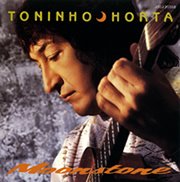
Clique aqui para baixar o disco/Download the album - RapidShare
........................................................
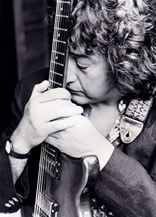 Antônio Maurício Horta de Melo nasceu em Belo Horizonte, no bairro Floresta, em 2 de dezembro de 1948. Filho de Prudente de Melo, mestre-de-obras, e Geralda Magela Horta de Melo, funcionária pública. Seu pai tocava violão e a mãe, violão e bandolim. O primeiro músico da família foi o avô materno, João Horta, funcionário da Central do Brasil que montava uma banda em cada lugar em que morava. Paulo, um de seus cinco irmãos, foi quem mais o incentivou para música. Aos 10 anos, Toninho começou a tocar violão e, aos 13, fez sua primeira composição, "Barquinho Vem". Aos 19 anos, iniciou a carreira de músico profissional tocando na noite. Na adolescência, conheceu Milton Nascimento, Márcio e Lô Borges e Beto Guedes – aos dois últimos ensinou harmonia. Mas foi a partir do Festival de Belo Horizonte, em 1969, que começou a união musical do grupo. No final dos anos 60, foi para o Rio de Janeiro, onde trabalhou com artistas como Elis Regina. Em 1972, organizou arranjos de base, tocou guitarra, baixo e percussão no disco Clube da Esquina. Após 10 anos nos EUA, em 1999 retornou ao Brasil com uma carreira internacional consolidada. Hoje dedica-se ao seu selo Minas Records e a publicação do Livrão da Música Brasileira, compilação de cerca de 700 partituras, abrangendo desde Carlos Gomes até compositores contemporâneos.
Antônio Maurício Horta de Melo nasceu em Belo Horizonte, no bairro Floresta, em 2 de dezembro de 1948. Filho de Prudente de Melo, mestre-de-obras, e Geralda Magela Horta de Melo, funcionária pública. Seu pai tocava violão e a mãe, violão e bandolim. O primeiro músico da família foi o avô materno, João Horta, funcionário da Central do Brasil que montava uma banda em cada lugar em que morava. Paulo, um de seus cinco irmãos, foi quem mais o incentivou para música. Aos 10 anos, Toninho começou a tocar violão e, aos 13, fez sua primeira composição, "Barquinho Vem". Aos 19 anos, iniciou a carreira de músico profissional tocando na noite. Na adolescência, conheceu Milton Nascimento, Márcio e Lô Borges e Beto Guedes – aos dois últimos ensinou harmonia. Mas foi a partir do Festival de Belo Horizonte, em 1969, que começou a união musical do grupo. No final dos anos 60, foi para o Rio de Janeiro, onde trabalhou com artistas como Elis Regina. Em 1972, organizou arranjos de base, tocou guitarra, baixo e percussão no disco Clube da Esquina. Após 10 anos nos EUA, em 1999 retornou ao Brasil com uma carreira internacional consolidada. Hoje dedica-se ao seu selo Minas Records e a publicação do Livrão da Música Brasileira, compilação de cerca de 700 partituras, abrangendo desde Carlos Gomes até compositores contemporâneos.Para mais informação, visite os sites:
A Música Audaz de Toninho Horta
Toninho Horta - The music of Minas Gerais
************************
The sound of Brazil are ringing together from its deepest reaches. Few feel its diverstity more intimately than Toninho Horta, whose elegant regional colors have been global ambassadors of the country's rich musical gifts for decades.
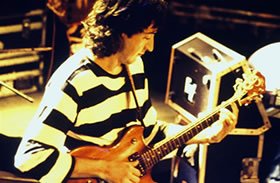 Horta embraces the most beautiful gestures of fingerstyle bossa nova, accompanying his own vocal lines with a grace that transcends mere harmonization; at a turn, he dispatches felt-toned octaves in soaring bop mode that utterly desegrates the invocations of jazz, classical, folk and african rythms within his shifting, surreal progressions. "I love to show a conception of my music", asserts Horta in an English riddled with the dialect of his native Belo Horizonte, the capital of the Brazilian state Minas Gerais. "That's much more meaningful to me than to just play guitar".
Horta embraces the most beautiful gestures of fingerstyle bossa nova, accompanying his own vocal lines with a grace that transcends mere harmonization; at a turn, he dispatches felt-toned octaves in soaring bop mode that utterly desegrates the invocations of jazz, classical, folk and african rythms within his shifting, surreal progressions. "I love to show a conception of my music", asserts Horta in an English riddled with the dialect of his native Belo Horizonte, the capital of the Brazilian state Minas Gerais. "That's much more meaningful to me than to just play guitar".Although his compositions and fluent playing brought him recognition from Belo Horizonte to Rio de Janeiro, it wasn't until Milton Nascimento's popular breakthrough that the city-and Horta especially-became a touchstone for a growing international awareness of Brazilian music. Horta accompanied Nascimento in 1970 for the singer's very first performance in Rio, and two years later participated in the making of the landmark recording Clube da Esquina. Toninho's first solo album Terra dos Passaros was recorded during a period when his works were being covered by everyone from Sergio Mendes to Flora Purim to Norman Connors' Starship Orchestra.
A self titled follow-up, released in 1980, featured the contributions of a professed Horta disciple whose own music has carried that pervasive influence to audiences worldwide: Pat Metheny.
When Toninho immigrated to New York in the mid '80s, he spent time in the clubs alongside two former Pat Metheny Group members, drummer Danny Gottlieb and bassist Mark Egan, as well as percussionist Manolo Badrena. To hone his craft, he did two taxing semesters at the Juilliard School. "When I took the placement tests, he laughs, "they said, Ah, you don't know anything about music! And you have to start again with the rudiments if you want to study here. It was very strange, but it was an interesting experience."
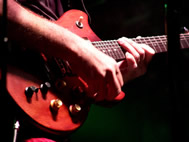 Diamond Land, Toninho's American label debut of last year, represented the results of his dabblings in orchestral study: Its lush, sweeping arrangements are propelled by a guitar voice that sings his melodies with a provocative sweetness. Moonstone is a return to the intimate setting that lends a more organic quality to Horta's compositions, several of which he performed unaccompanied at the urging of producer Ricardo Silveira, a fine Brazilian guitarist in his own right. For the ensemble pieces, Toninho is joined again by Egan and Gottlieb, along with the Brazilian vocal group Boca Livre, drummer Paulo Braga, bassist Steve Rodby, pianist Eliane Elias and percussionist Nana Vasconcelos, among many other stylistically diverse musicians.
Diamond Land, Toninho's American label debut of last year, represented the results of his dabblings in orchestral study: Its lush, sweeping arrangements are propelled by a guitar voice that sings his melodies with a provocative sweetness. Moonstone is a return to the intimate setting that lends a more organic quality to Horta's compositions, several of which he performed unaccompanied at the urging of producer Ricardo Silveira, a fine Brazilian guitarist in his own right. For the ensemble pieces, Toninho is joined again by Egan and Gottlieb, along with the Brazilian vocal group Boca Livre, drummer Paulo Braga, bassist Steve Rodby, pianist Eliane Elias and percussionist Nana Vasconcelos, among many other stylistically diverse musicians. The record is an exquisite statement of melody and mood; on the title track, Horta reunites with Metheny-whom Toninho is often surprisingly said to "sound like"- for a subtle acoustic dialog that brings the two guitarists together more inseparably than ever before. "A lot of people I speak to make the comparison", Toninho smiles, "but there are many guys who play the electric guitar more similarly to the way I do, like John Abercrombie. Lee Ritenour came to see my show in California, and Al di Meola saw me recently, and the guys loved the stuff. Lee told Ricardo, 'Toninho's incredible because he doesn't play licks'. I try not to sound like anybody else, and I prefer to make my mistakes and have more limited playing in terms of scales. I don't want to play licks. It's good, but I never want to do it. I have my licks, "he laughs, "but that's my way".
Why the more focused approach?
I've always loved orchestration. When I was very young, between 10 and 13, I listened to much American stuff, like Stan Kenton, Stan Getz, Nelson Riddle, Ella Fitzgerald and I loved the big arrangements. Then one day I started playing guitar, and realized it's better to use six strings most of the time: I'd play with five fingers of the right hand to make a big sound, and use a lot of open strings to get more of an orchestrated sound. On both of the records I did in Brazil, and Diamond Land, I put too much (laughs). I had the opportunity to show my stuff playing-wise, but also to invite friends to play with me in the kinds of music that enjoys a lot of orchestration-very full. But Ricardo told me, "Toninho, you have to concentrate more on yourself now, on playing more". and besides, I promised the people at the record company that on the next album, I'd make it all just myself, and maybe some decoration. But between the last album and Moonstone, I'm more focused in my music, because I think the people in the company and maybe the United States want to listen more to me than a lot of stuff around it.
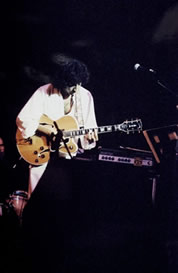 I love to play guitar, but I don't think I'd want to be a guitarist like Pat Metheny, because I like composing, singing, playing piano, production-I co-produced the first album I did here. But I thought I'd make it more simple, with less outside people, to show more of the styles, acoustic and electric, that I can play.
I love to play guitar, but I don't think I'd want to be a guitarist like Pat Metheny, because I like composing, singing, playing piano, production-I co-produced the first album I did here. But I thought I'd make it more simple, with less outside people, to show more of the styles, acoustic and electric, that I can play.If you were to make a record that would really represent Toninho Horta, would it involve just singing and playing acoustic guitar?
Yeah. What got me into playing electric guitar was hearing people like Wes Montgomery, Barney Kessel and Tal Farlow. But I never took lessons, I just listened a lot. I started when I was 15 years old. My older brother Paulo is a bass player, and he's got a lot of American records. I listened all the time, but never copied one phrase from those guys. Maybe one chord. But I just listened and listened, and I never got a teacher in Brazil. And I really listened to Brazilian musicians, guitar players like Baden Powell, Chiquito Braga, Joao Gilberto, of course, and Jorge Ben. Growing up in Belo Horizonte, I met many musicians, but I found my style maybe when I was 18; at that time people said 'Toninho, you've got good harmony, god ways of music'. I would like to have studied then, but it's good now.
Some musicians have a creeping fear that if they learn the musical language, they'll get taken in by all the rules and find it more difficult to express themselvs. Did you experience that while studying at Juilliard?
Well, I got into a lot of orchestration, but then again, my idea was only to stay in Juilliard for a short time. I took an exam there, and it was so bad, even though I studied in Brazil in a private theory class for about two months before. At Juilliard, I made it through the beginning of harmony in four voices. I had a good time, and my teacher, a conductor named C.Jeffrey Langley, told me, "You don't need this", he made tests of all the others in the class, and they all knew that a Bb major scale had these notes with the accidentals or whatever, but when he started a test at the piano, on singing and identifying notes, I was always the best of the class. I have no theory, but a lot of experience. But I had a good time there; it helped in, learning to write better. A little bit, not too much (laughs).
Did it help your playing?
For playing, no, and for composing, no. Just for writing and understanding something about basic theory. But for applications like playing my music with other guys, definetely not.
Because studying harmony strengthens arranging skills, it also often helps guitarists learn more about moving the differents voices around on the instrument. Didn't your solo playing benefit from that?
Of course, but not intentionally. I always prefer a more natural sound. I've listened to all kinds of music at all times in my life. Right now, I listen to (arranger) Claus Ogerman and think about it, and that helps translate ideas, just keeping information. But when I sit with the guitar to compose a song, I never remember any scale or musician. I just play; maybe an old song of mine, or one by Antonio Jobim or Jorge Ben or Cole Porter (sings Porter's "I love you") - I love that song. Then I start to improvise lines, find some idea, and then I open my mind and start to compose. But I never decide, "Oh, now I'm going to compose a 6/8 song. " I once wrote for a small symphony in Campinas the second biggest city in Sao Paulo. It was a piece called "Earth", in four movements, and in this kind of work, you have to concentrate: I wanted to start with a big earthy sound, and then a happy song, so I had to compose a slightly faster part, and then be able to create sadness. I can work in a focused style, but I never think about the time, the rythm, or the chords. I just compose and play. It's easier for me, and it's best for the people who listen. It seems so natural.
When you compose, do you create the melody first and then build an accompaniment around it?
It all comes at the same time. Always together. Melody, harmony, and rythms.
When you came over to America, did people immediately compare your style to Pat Metheny's?
Yeah, of course. All the time (laughs). The first time I heard it it bothered me, but not now, because it happened so much that I got used to it. Pat and I have the same idols on guitar, and he's self taught, too. Like I said, I started when I was very young-my brother and mother showed me some chords. So Pat and I have some similarities. I met him in 1980 in Brazil: Celia Vaz, a brazilian guitar player who studied with Pat at Berklee, introduced us, and the first time we got together, he loved me as a person and for my playing. I loved him too-I bought Pat Metheny Group and American Garage (both on ECM) before I went to see him. And I remember saying, "If only someday I can play with Mark Egan (laughs)! "It was incredible because after we played together the first time, he said, "Toninho, would you like to make a record?" Some people told me that Pat and (Pat Metheny Group keyboardist) Lyle Mays, when they were at Berklee in 1972 and 1973, had Milton's first album, Clube da Esquina, which they bought in Brazil, and after that, they started to listening to Brazilian music, and more from the composers of Minas gerais. Since that time, he has gotten into many interesting records.
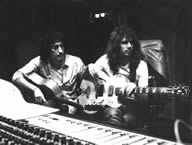 When Pat and Lyle came to Brazil, they said " Let's go to Clube Da Esquina to take pictures", but esquina is just a corner; it doesn't have a club (laughs), it's only a name. Close to the Minas Gerais corner in Brazil, there was a house belonging to (singer) Lo Borges' family: his father, his brothers, everybody playing and singing and writing songs, and sometimes I'd go and play with them. People would come and play until Milton broke out in Brazil in 1967, and then we started to play with him. I think my similarity to Pat is more natural than anything else. I loved him, and I never listened to just one solo. He's listened to my stuff a lot, but I don't think he copied anything. It's a similarity of emotion.
When Pat and Lyle came to Brazil, they said " Let's go to Clube Da Esquina to take pictures", but esquina is just a corner; it doesn't have a club (laughs), it's only a name. Close to the Minas Gerais corner in Brazil, there was a house belonging to (singer) Lo Borges' family: his father, his brothers, everybody playing and singing and writing songs, and sometimes I'd go and play with them. People would come and play until Milton broke out in Brazil in 1967, and then we started to play with him. I think my similarity to Pat is more natural than anything else. I loved him, and I never listened to just one solo. He's listened to my stuff a lot, but I don't think he copied anything. It's a similarity of emotion.Did you improvise "Moonstone", your duet with Pat?
He's known the song from a long time ago. He invited me to play with him at the wedding of (actor) Robert Duvall. I played acoustic and he played electric. Pat always loved that song. And when he came to record my album, I asked, "Pat, what are we going to play-maybe 'Diana'? Because he also liked that one, and I never recorded it in the States. We played that and another song, and then we just started playing "Moonstone". We just started playing it. He gave some ideas about the form, then he improvised, then I improvised, then we played together, just very simple. We made six takes, and used the fourth one. I'm happy because Ricardo originally thought Pat wouldn't play on the record, but we are friends, and it's good because we wouldn't otherwise have had the opportunity to get together. We had a great time there.
Do you play a custom acoustic?
I use an Hermanos Conde, from Madrid, Spain. It's a flamenco guitar. Paco De Lucia may use a similar one, but his model is more classical. Mine is flamenco.
What's the difference?
It's cheaper and lighter. and the classical has a slightly wider neck. But for me, it's perfect because it's very easy to play. I don't have nails, and the guitar is very flat and easy to get at. For recording, it's very nice. I never use a pick with acoustic-only fingers.
Do you amplify that guitar?
No, I like it direct. I sometimes use an equalizer, a very old 6-band MXR pedal. But I have a Shadow pickup on the Hermanos Conde, and they might use a Boss DD-3 digital delay. For this album, I also played a Roland GR-303 guitar, but I only use the syntheseizer part once or twice a year. I use plain guitar, maybe some chorus, but not too much, through a Roland JC-120 amp. I used that for "Francisca," "Bycycle Ride". On "Liana", I used a 1959 Telecaster, which I borrowed from the studio owner, for a slightly brighter sound. Some people brought a (Gibson) ES-175 just for the recording, which I played on "Yarabela" and "Spirit Land", but then I decided to use only acoustic on that song. Then my Hermanos Conde cracked while recording, and I had to get another instrument. My friend lent me an acoustic/electric Takamine for the last two songs I did, "Gershwin" and "Saguin", which I performed by myself. It sounded a little different, with a little more middle, but it's okay. The music is more important than the equipment.
Have you ever worked with Joe Pass?
I met him at G.I.T. in California, where I did a seminar with Abe Laboriel. I met some guys from Brazil there around '83, and was supposed to come and do a seminar on Brazilian music, but I didn't have any time. Then a friend introduced me to Joe Pass the same week, who told me that Abe was doing a seminar for Latin music and asked if I would get involved. Larry Carlton was there (drummer) Ralph Humphrey, and a percussionist, and I played "I love you", I played a solo only with chords, and the people loved it. I have a tape of the people (mimics wild crowd noice). 300 guitar players in G.IT., never heard a chord solo!
Your Latino rythms must have freaked everybody out?
Yeah (sings straight ahead jazz rythms, then more anticipated rythms). It's got the feeling of jazz, but with special syncopations all over the place. The United States is incredible. When I was very young, I listened to all sorts its music, and it's great to get the opportunity to play my music here.
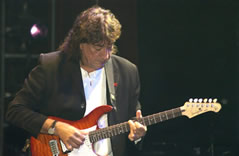 I worked in Rio for 10 years, and my producer told me, "Your place is the United States, not Brazil. "In Brazil there aremany good musicians and a lot of rythms, like baiao, samba, modinha- because Brazil is so big. The north is heavy influenced by Africa. The state of Bahia has african influences, and instruments like the congas (sings percussively)- Minas Gerais, my state, is heavily influenced by Spain and Portugal. Modinhas are like waltzes- not like jazz waltz-but Chorinhos and Modinhas have many influences from Spain and Portugal; mandolins, violins and guitar for example. The melodies and rythms are very Spanish. The rythms are very folk-song-like. And Rio de Janeiro has a more urban influence. Brazil is great musically, but to make music there, it's very, very hard, economically, politically, and socially. You see, you> have contemporary jazz, rock and pop. In Brazil now, we have instrumental music (laughs). The musicians don't have many opportunities, and to play at nights at clubs is hard. Also, there isn't much information. Here, you can buy the records of John Coltrane or Chopin or debussy, and you have the solos of Tal Farlow and Barney Kessel and Joe Pass. And the Berklee school, you get a thousand people playing the same thing, which actually is kind of bad. In Brazil, you don't have this, because it's hard to get a teacher and have big schools and information and books. I hope to release in Brazil a Real Book with about 350 songs by composers from Minas Gerais. Many important guys have risen from Brazil. The cultural secretary of Minas Gerais may be able to give the money for the project. It's important for the United States, because Brazilian music is better here again now, and there is interest in these harmonies and melodies.
I worked in Rio for 10 years, and my producer told me, "Your place is the United States, not Brazil. "In Brazil there aremany good musicians and a lot of rythms, like baiao, samba, modinha- because Brazil is so big. The north is heavy influenced by Africa. The state of Bahia has african influences, and instruments like the congas (sings percussively)- Minas Gerais, my state, is heavily influenced by Spain and Portugal. Modinhas are like waltzes- not like jazz waltz-but Chorinhos and Modinhas have many influences from Spain and Portugal; mandolins, violins and guitar for example. The melodies and rythms are very Spanish. The rythms are very folk-song-like. And Rio de Janeiro has a more urban influence. Brazil is great musically, but to make music there, it's very, very hard, economically, politically, and socially. You see, you> have contemporary jazz, rock and pop. In Brazil now, we have instrumental music (laughs). The musicians don't have many opportunities, and to play at nights at clubs is hard. Also, there isn't much information. Here, you can buy the records of John Coltrane or Chopin or debussy, and you have the solos of Tal Farlow and Barney Kessel and Joe Pass. And the Berklee school, you get a thousand people playing the same thing, which actually is kind of bad. In Brazil, you don't have this, because it's hard to get a teacher and have big schools and information and books. I hope to release in Brazil a Real Book with about 350 songs by composers from Minas Gerais. Many important guys have risen from Brazil. The cultural secretary of Minas Gerais may be able to give the money for the project. It's important for the United States, because Brazilian music is better here again now, and there is interest in these harmonies and melodies.Do you feel a responsability to the music of Brazil, or are your own concepts and playing your priorities now?
I have to be true, because until now, I haven't in a way. If I didn't make a record with more of myself playing, it's because I sometims feel insecure. When I play guitar and sing, or I accompany another person, it's easy for me. But when I have to play my music, play the melody and improvise, it's more difficult. This may be because until now, I've used too many people playing with me on a record, just because I loved it. But I never prepared much forehand. I find the songs and the form, but most of the time I write in the studio:"Oh, you just played it! Improvise here, make fills here, and if you want to, change it!" I like to show my music, and I am not interested in particular aspects. I have to concentrate more on playing than on the conception of the songs, but that's okay. Each of us has his own way. 100,000 people can play with more technique and ideas than I can, but I think when I play a phrase, I play it my way, and nobody plays like that but me.
For more info, visit:
A Música Audaz de Toninho Horta
Toninho Horta - The music of Minas Gerais

 Br-Instrumental no Twitter
Br-Instrumental no Twitter





7 comentários:
EXCELENTE!!!!!!! O que dizer desse grande nome?? sem comentários :D
Abração!
PS: Já baixei o novo arquivo do Yamandú, obrigado!!
muito bom mesmo o site...
queria pedir um favor...
tenho TODOS do Toninho,
só me falta o Durango Kid,
mas não consigo baixar do link que tenho (as "letrinhas" do rapidshare não aparecem).
será que teriam como postar este disco dele?
abraços!!!
Marcelo,
Pode deixar que eu postarei o Durango Kid.
Abs,
mvcosta
Alguem teria um disco do Marcio Montarroios(dos 70 ou 80 sei la)instrumental que é excelente?
Valeu
Flavio Ricardo - Niteroi - RJ
O Post do Toninho Horta está inativo. Se for possível, reative-o
por favor.
Grato.
Toninho Horta - "Moonstone" (1991 - Polydor 839734-1)
1. Andando de Bicicleta (Bicycle Ride)
(Toninho Horta)
Toninho Horta: violão, guitarra e voz
Eliane Elias: piano
Steve Rodby: baixo
Paulo Braga: bateria
Armando Marçal: tamborim
Steve Thornton: shaker
arranjo: Toninho Horta
2. Manoel, O Audaz (Eternal Youth)
(Fernando Brant - Toninho Horta)
Toninho Horta: violão e voz
Billy Drewes: sax soprano
Onaje Allan Gumbs: sintetizadores
Mark Egan: baixo fretless
Danny Gottlieb: bateria
Naná Vasconcelos: caxixi, sinos
Steve Thornton: wood block, shaker, tamborim
arranjo: Onaje Allan Gumbs e Toninho Horta
3. Gershwin
(Toninho Horta)
Toninho Horta: violão, guitarra e voz
arranjo: Toninho Horta
4. Pedra da Lua (Moonstone)
(Cacaso - Toninho Horta)
Toninho Horta: violão [canal direito]
Pat Metheny: violão [canal esquerdo]
arranjo: Toninho Horta
5. Liana
(Arnaldo P. Cruz - Toninho Horta)
Toninho Horta: violão e guitarra
Rudi Berger: violino
Billy Drewes: sax soprano
Russell Ferrante: sintetizadores
Steve Rodby: baixo
Danny Gottlieb: bateria
Naná Vasconcelos: percussão
arranjo: Ricardo Silveira, Russel Ferrante e Toninho Horta
6. Yarabela
(Toninho Horta)
Toninho Horta: violão, guitarra e voz
Randy Brecker: flugelhorn
Onaje Allan Gumbs: synth horn
Russell Ferrante: synth strings
Willa Bassen: sintetizadores
Luizão Maia: baixo
Armando Marçal: percussão
Boca Livre (Zé Renato, Maurício Maestro, David Tygel, Lourenço Baeta): coro
arranjo: Maurício Maestro, Onaje Allan Gumbs, Russel Ferrante e Toninho Horta
7. Francisca
(Toninho Horta)
Toninho Horta: guitarra e violão
Billy Drewes: sax soprano
Danny Gottlieb: bateria
arranjo: Toninho Horta
8. Sun Song
(Toninho Horta)
Toninho Horta: violão e voz
arranjo: Toninho Horta
9. Nunca Vou Esquecer (I'll Never Forget)
(Toninho Horta)
Toninho Horta: violão e voz
Rudi Berger: violino
Billy Drewes: sax soprano
Russell Ferrante: teclados
Steve Rodby: baixo
Danny Gottlieb: bateria
Naná Vasconcelos: percussão e vozes
arranjo: Toninho Horta
10. Spirit Land
(Yuri Popoff)
Toninho Horta: violão
Billy Drewes: sax alto
Russell Ferrante: teclados
Mark Egan: baixo fretless
Paulo Braga: bateria
Robertinho Silva: percussão
Boca Livre (Zé Renato, Maurício Maestro, David Tygel, Lourenço Baeta): coro
arranjo: Maurício Maestro, Ricardo Silveira, Russel Ferrante e Toninho Horta
O meu camarada que blog maravilhoso que eu descobri hoje.
Se puder colocar algo do Marcio Montarroios também eu agradeço.
Saúde e paz para vc.
Postar um comentário